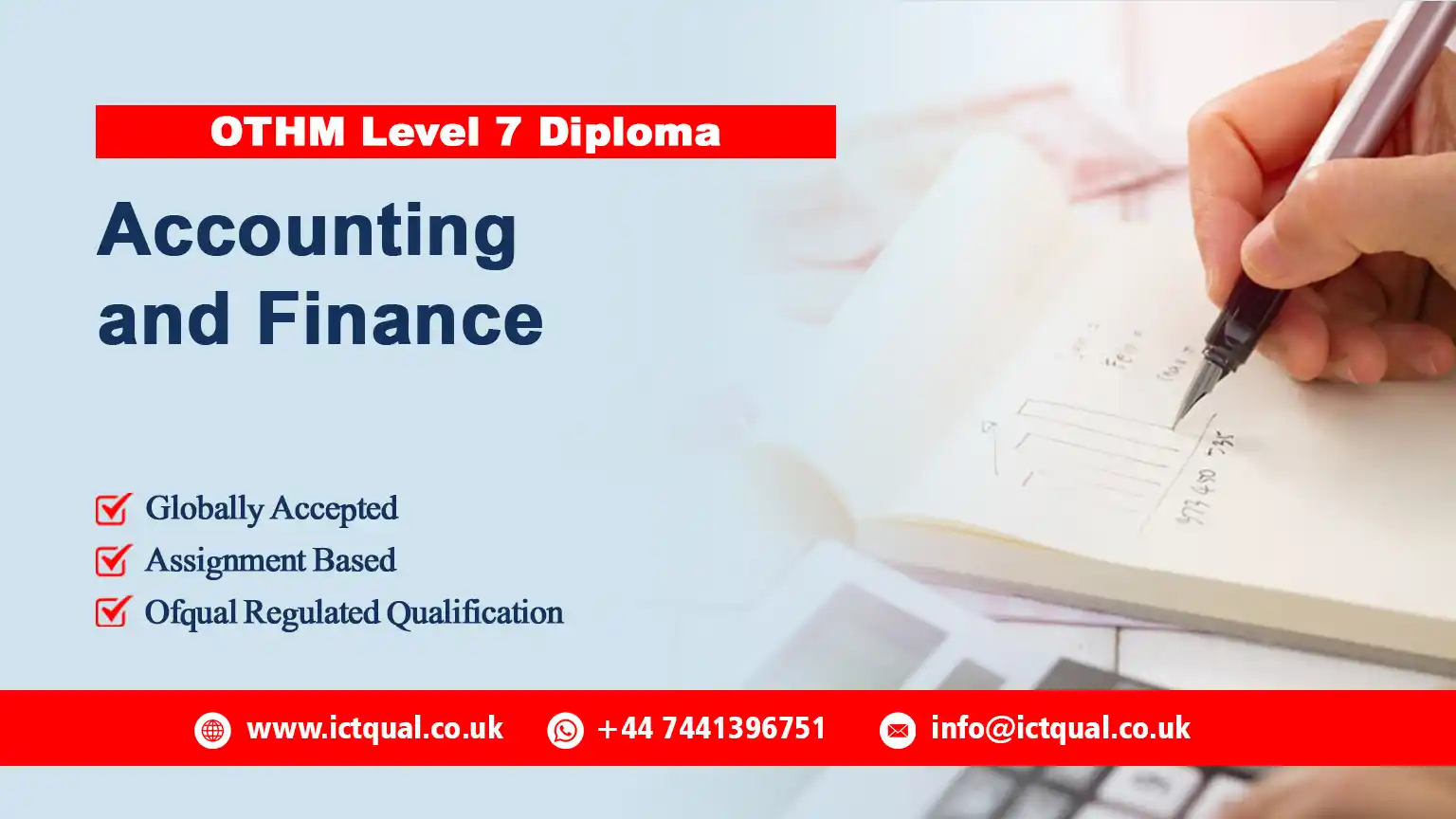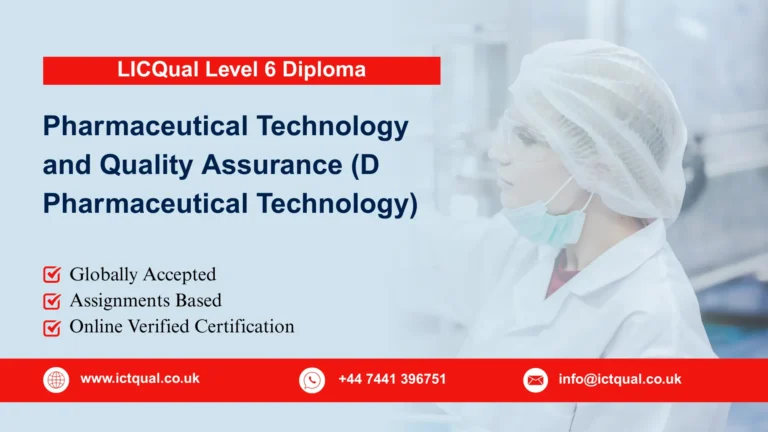Unlock new career opportunities and enhance your financial acumen with the OTHM Level 7 Diploma in Accounting and Finance. This advanced qualification is designed for professionals who aim to deepen their understanding of complex accounting and finance principles, equipping them with the skills needed for senior roles in the financial sector.
The OTHM Level 7 Diploma delves deep into advanced financial principles, equipping you with the knowledge and skills needed to navigate complex financial landscapes with confidence. From financial reporting and strategic financial management to audit and assurance, taxation, and corporate governance, this diploma covers a broad spectrum of topics essential for success in the finance industry.
Forget dull textbooks and theoretical lectures. Our diploma program emphasizes practical learning experiences that mirror real-world scenarios. Through case studies, simulations, and hands-on projects, you’ll gain valuable insights and develop practical skills that you can immediately apply in your professional endeavors.
Advance your career in accounting and finance with the OTHM Level 7 Diploma and gain the skills and knowledge needed to excel in high-level financial roles. Enroll today to take the next step in your professional development and achieve your career goals in the dynamic field of finance.
Don’t let opportunities pass you by. Enroll in the OTHM Level 7 Diploma in Accounting and Finance and take the first step towards achieving your career goals. Join a community of ambitious professionals committed to excellence in finance and embark on a rewarding journey of growth and success.
The OTHM Level 7 Diploma in Accounting and Finance offers a rigorous and advanced education in financial management and accounting practices, designed for professionals aiming to elevate their expertise in the financial sector.
This diploma provides a comprehensive curriculum that covers critical areas such as advanced accounting principles, strategic financial management, and corporate finance. Participants will gain an in-depth understanding of complex financial reporting, risk management, and compliance with international standards.
The course integrates theoretical knowledge with practical application through real-world case studies and exercises, ensuring that learners can effectively analyze and address financial challenges. Emphasizing leadership and strategic insight, the diploma prepares individuals for senior roles in accounting and finance, equipping them with the skills needed to drive organizational success and navigate the complexities of global financial environments.
With a focus on ethical standards and professional integrity, this qualification is ideal for those seeking to enhance their career prospects and contribute significantly to their organizations’ financial health.
The OTHM Level 7 Diploma in Accounting and Finance qualification consists of 6 mandatory units for a combined total of 120 credits, 1200 hours Total Qualification Time (TQT) and 600 Guided Learning Hours (GLH) for the completed qualification.
| Sr# | Unit Title | Credit Hours |
|---|---|---|
| 1 | Investment Analysis | 20 |
| 2 | Corporate Reporting | 20 |
| 3 | Global Finance and Strategy | 20 |
| 4 | Strategic Financial Management | 20 |
| 5 | Strategic Audit | 20 |
| 6 | Business Research Methods | 20 |
This course is tailored for individuals who are looking to advance their careers in the field of accounting and finance. It is ideal for:
- Finance Professionals: Those already working in finance-related roles who wish to enhance their skills, broaden their knowledge base, and advance their careers to more senior positions.
- Accounting Professionals: Individuals with accounting backgrounds who want to deepen their understanding of finance, broaden their skill set, and pursue career opportunities in financial management, analysis, or auditing.
- Graduates: Recent graduates with degrees in accounting, finance, or related fields who are seeking specialized training to kickstart their careers in the finance industry.
- Career Changers: Professionals from other industries who are interested in transitioning into finance-related roles and want to acquire the necessary knowledge and skills to succeed in their new careers.
- Aspiring Entrepreneurs: Individuals who are planning to start their own businesses or ventures and recognize the importance of financial literacy and expertise in managing finances effectively.
- Anyone Seeking Career Advancement: Those who aspire to climb the corporate ladder, take on more challenging roles, or increase their earning potential by obtaining a higher-level qualification in accounting and finance.
Upon completing the OTHM Level 7 Diploma in Accounting and Finance, participants will achieve the following learning outcomes:
Investment Analysis
- Understand different types of securities.
- Understand the regulation of security trading and new issues in world markets.
- Be able to apply principles of investment theory, securities and market analysis.
- Understand the principles of taxation.
- Understand the laws and regulations controlling the financial services industry.
- Be able to plan, manage and assess client portfolios.
Corporate Reporting
- Understand the accounting and finance regulatory framework.
- Understanding accounting concepts, principles and theories.
- Be able to prepare and interpret accounting information.
- Be able to review specific policies, practices and regulations within corporate accounting.
Global Finance and Strategy
- Understand the concept of globalisation.
- Understand the impact of the global business environment on national and multinational business organisations.
- Be able to construct strategies that will result in the enhancement of organisational value.
- Be able to evaluate the financial consequences of strategic decisions.
- Understand appropriate sources of finance.
- Be able to assess techniques to manage global risk.
- Be able to assess potential investment decisions and global strategies.
Strategic Financial Management
- Understand the significance of strategic management and decision making to the performance of a business organisation.
- Understand key financial theories.
- Be able to apply stakeholder analysis and corporate valuation techniques.
- Understand the role of culture in strategic decision making.
- Understand performance measurement systems.
Strategic Audit
- Understand historic and current auditing processes and procedures.
- Understand the importance of legal and professional requirements when completing an audit.
- Understand audit strategy
- Understand the risk involved in the audit process.
- Understand current developments in auditing.
Business Research Methods
- Be able to identify research problems and formulate research objectives.
- Understand how to review the literature on a research topic.
- Be able to design appropriate business research methodologies.
- Be able to develop a research proposal.
Register Now
Fee Structure for OTHM Level 7 Diploma in Accounting and Finance
Future Progression
The OTHM Level 7 Diploma in Accounting and Finance qualification empowers learners to advance their careers or pursue further studies. Since this qualification is approved and regulated by Ofqual (Office of the Qualifications and Examinations Regulation), learners have the opportunity to seamlessly transition to master’s top-up programs at numerous universities in the UK and abroad, often with advanced standing.







